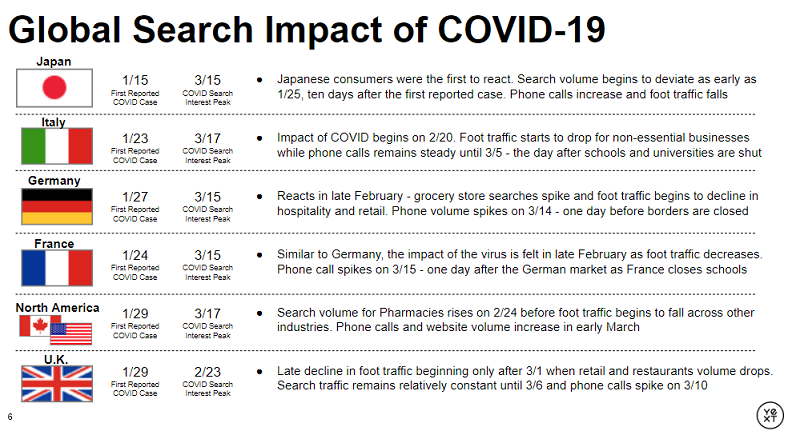The UK saw the biggest average increase of all countries, while local search volume for restaurants in the UK and similarly in France plunged to 95% below expected levels, according to new global research.
Search experience cloud firm Yext has released its COVID-19 Global Search and Engagement Report. The report, based on data from over 100 different publishers including Google and Safari, shows how consumer searches have changed following the outbreak. It also contextualises much of the impact that many industries have seen – from retail and hospitality to mailing services.
The report follows an 84% increase in the number of fact updates clients have made in the Yext platform. The uptick indicates businesses are relying on their Yext Knowledge Graphs to provide their customers with accurate and timely information during the COVID-19 pandemic.
“The outbreak of COVID-19 has drastically changed the behaviours of consumers within the UK and globally,” said Jon Buss, Managing Director of Yext. “At such an unprecedented time, search data analysis becomes increasingly important for businesses to understand dramatic shifts in consumer behaviour, especially as many businesses begin to change up strategies and, in some instances, entire business models. With more people than ever turning to online deliveries, these results emphasise the integral need for businesses to ensure information online is managed properly with accuracy.”
Some key insights* from Yext’s COVID-19 Search and Engagement Report include:
● The United Kingdom | Grocery shopping peaked. The UK saw the biggest average increase of all countries analysed during the period with a 348% growth in online grocery searches in March?, largely due to a huge surge in online orders, and saw a peak of 440% during its busiest day on the 18th March. The drastic increase emphasises the pressure to ensure supplies are well stocked as lockdown took place in the UK.
● The United Kingdom | Diners opt to eat at home. Reflecting trends around the world, local search volume for restaurants in the UK and similarly in France plunged to 95% below expected levels in March, as restaurants temporarily closed or transitioned to takeout and delivery. Clicks for directions to restaurants in these countries saw the same precipitous drop to 95% below expected levels.
● Germany | Luxury is put on hold. Unsurprisingly, search volume for luxury vendors dropped to 95% below expected levels in March as non-essential retailers closed their doors. All consumer actions – including clicks to call, clicks for directions, and clicks to websites – also plummeted to 95% below expected levels for this industry.
● Italy | People literally send their love and support. Mailing services are in high demand to send packages and stay connected with friends and family in the midst of extreme restrictions on travel or public gatherings. Not only did local search volume to mailing services peak at 114% above expected levels near the end of March, clicks to call these businesses reached 198% above expected levels.
● Japan | People rush to stock their shelves. Following news of the outbreak in Japan, search volume in the region increased significantly for grocery stores, peaking at 307% above expected levels near the end of February. Clicks to call local supermarkets were particularly high, reaching up to 78% above expected levels.
● North America | Telemedicine takes off. With doctors recommending phone appointments over in-person visits, clicks for directions to hospitals bottomed out at 70% below expected levels in March. Clicks to call emergency rooms and urgent care peaked at 57% and 54% above expected levels, respectively, as patients sought out medical advice and COVID-19 test availability.
● North America | Staycations are the new normal. Mirroring global trends for the hospitality industry, consumer actions around travel dipped significantly as restrictions and bans have been imposed. Search volume for hotels plunged to 54% below expected levels in March, while clicks for directions fell 95% below expected levels.
The report is accompanied by Yext’s interactive COVID-19 Search Data Hub, where users can apply custom country and industry filters to the dataset to further explore search volume and behaviour recorded during the pandemic.
Click here to explore Yext’s COVID-19 Search and Engagement Report.

